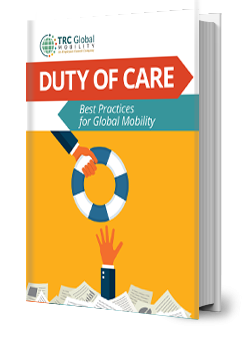
Duty of care is a longstanding common law principle. In the employer-employee relationship, the duty of care definition refers to the company’s obligation to take reasonable actions to protect its employees and safeguard their health and safety. For relocating employees, the duty of care is the legal and moral obligation of an employer to ensure the welfare of employees and their families throughout a relocation or assignment.
The sudden pandemic-driven disruption of business and threat to all employees underlined the importance of regular risk assessments and appropriate mitigation. For those assignees and their families living outside of their home country, it was difficult to know if the best response to the crisis was to shelter in place or return home, but one thing that’s for sure, is that one of the most fundamental parts of duty of care is safeguarding the physical and mental health of employees and their families.
Physical and Mental Health Considerations
Health insurance is usually portable within the home country, but the employer should ensure that the employee’s current benefits will remain in force.
For employees on a global assignment, healthcare systems and coverage vary widely worldwide. Employers must ensure that the employee and family have proper global healthcare coverage before they arrive in the host location to cover any required medical treatment while they are there. The policy should include medical evacuation services if needed.
Too often, companies do not pay sufficient attention to mental health considerations in planning a relocation or assignment. According to the World Health Organization, one in four people struggle with a mental health issue at some point in their life, and psychologists rank relocation as one of life’s most stressful events. The pandemic has created even more stress among employees, whether they are relocating or not.
More than providing coverage for mental health services, companies should also acknowledge the stress inherent in global mobility and promote a culture where it is ok to ask for help. Many companies adopt and promote Employee Assistance Plans (EAPs) and encourage employees to take several “mind and body breaks” throughout the workday.
Safety and Security Considerations
Companies that send employees to high-risk locations typically require them to attend a briefing with an internal security team or an external security firm before going on assignment. More companies are incorporating security briefings into their mobility programs no matter where the employees and their families are relocating.
While employees who are relocating to high-risk locations will naturally be on guard, anyone in an unfamiliar place could face risks from civil unrest, terrorism or even kidnapping. Several major cities in the U.S. experienced spontaneous demonstrations and violence last year. In developing countries, expatriates can be at risk for abduction or carjacking, even in areas considered “safe.” In some cases, a hired car and driver might be necessary as a safety precaution.
Safety and security measures and contingency planning are not just for areas experiencing civil unrest. Companies should ensure that employees relocating to areas with unpredictable weather or natural disasters such as tornados, hurricanes or earthquakes are briefed on local emergency procedures.
Area orientations should include how to contact the police and fire departments, the location of local hospitals and emergency care facilities, how to utilize public transportation and how to handle utility outages or brownouts.
Two additional pre-departure services can contribute to the employee’s safety and security: cross-cultural and language training. Cross-cultural training will help acclimate the employee and family to the new culture and potentially help them avoid unsafe situations. Language training will increase assignee and family comfort levels and help them recognize and avoid or de-escalate dangerous situations.
Duty of Care Takes on New Importance
Employers who relocate employees and their families, deploy them on international assignments or ask them to travel for business have a legal and ethical responsibility for their safety and well-being.
To learn more about what the duty of care includes beyond physical and mental health considerations, download this eBook.




